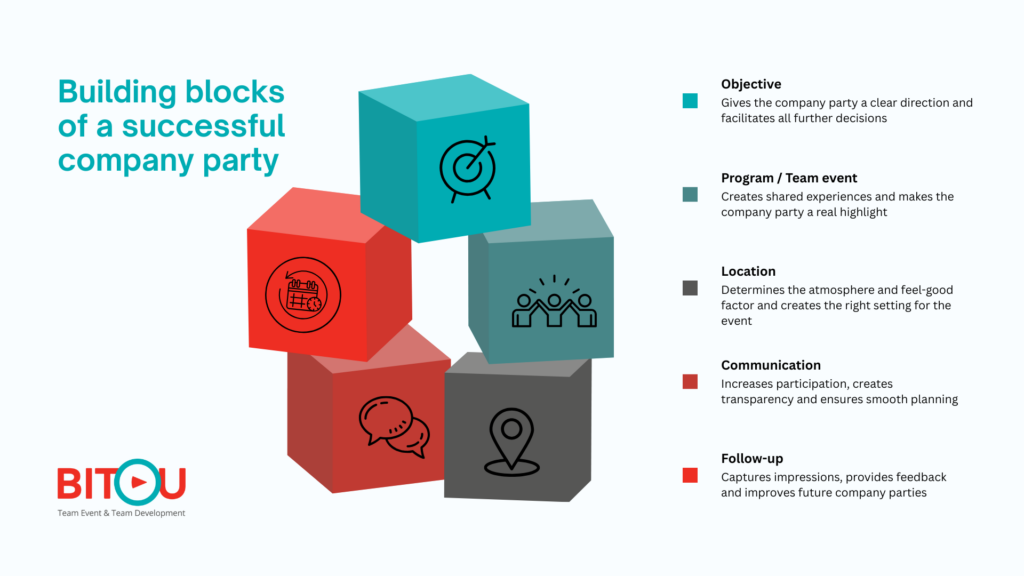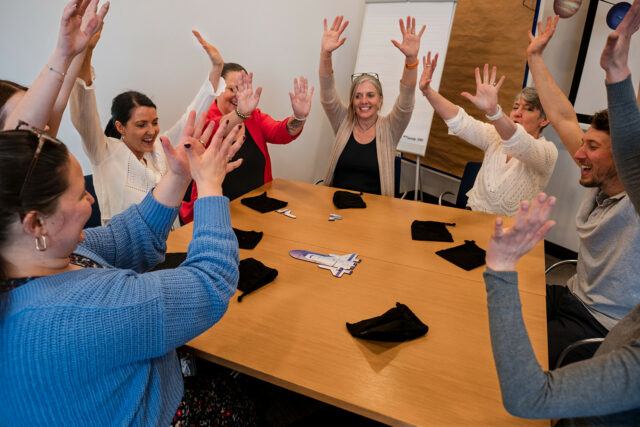Planning company parties: Tips for unforgettable events

Why company parties are more than just a pleasant get-together
A company party strengthens team spirit, boosts motivation and creates opportunities for people to meet outside of the everyday working environment. Shared experiences contribute significantly to trust and cohesion, especially in hybrid or distributed teams.
Well-planned company parties convey appreciation and have a long-term positive effect on employee retention – an effect that is becoming increasingly important in modern companies.
The benefits of good company parties
Company parties make a noticeable contribution to corporate culture. They strengthen team spirit, improve communication and can have a positive impact on employer branding. Joint activities create points of contact that are often lacking in everyday working life.
Typical positive effects of a company party:
- increased team cohesion
- improved internal communication
- greater motivation and identification
- reduced potential for conflict
Modern company parties also often feature interactive, sustainable or hybrid elements. They involve different groups and ensure a contemporary, varied experience.

The right start: goals, schedule and budget
A successful company party begins well before the day of the event. Early planning – ideally three to six months in advance – makes it easier to coordinate with service providers and book suitable venues.
Important planning principles:
- Define objectives: Should the company party promote team building, express appreciation or celebrate successes?
- Set a schedule: Voting, service providers, programme structure.
- Plan your budget realistically: Venue, catering, technology, programme – plus a buffer for the unexpected.
A clear structure makes all further steps easier.
The perfect event format for any company party
Depending on the occasion, a company party requires a different programme level. A suitable selection ensures that the mood, purpose and atmosphere are in harmony.
For informal occasions such as summer parties, anniversaries or Christmas celebrations, the following are suitable
traditional team events, that focus on fun, exercise and shared experiences. They create a relaxed atmosphere and encourage informal exchanges.
For kick-offs, project launches or cross-departmental meetings, we recommend
intelligent team building. These formats provide entertainment while also strengthening communication, collaboration and problem-solving skills.
For teams undergoing change processes or taking on new roles, it is
team development sensible. Such programmes pick up on dynamics and support structure, cooperation and clarity.
In particularly complex situations, such as ongoing challenges or significant team conflicts, help is available.
team coaching, offer individual, in-depth support.
This ensures that every company party has a format that is optimally tailored to the occasion and the needs of the team.
The right location for a successful company party
The location has a significant influence on the impact of a company party. It should not only be functional, but also support the desired atmosphere.
Important criteria are:
- good accessibility
- sufficient capacity
- accessibility
- appropriate infrastructure
When hosting outdoor company parties, it is important to have weatherproof alternatives so that you can react flexibly. Whether it’s a modern event hall, a natural outdoor area or a rustic barn – the surroundings should enhance the experience.
Communication as a factor for success at company parties
A successful company party depends on clear and timely communication. A save-the-date notice signals in good time that participation is possible and desired. The invitation should provide concise and helpful information, including directions, schedule, dress code and any special instructions. This ensures that all employees receive relevant information at the right time.
Catering & Decoration: creating an effective atmosphere
Cuisine and design shape the overall impression of the company party. Different types of catering – such as buffets, finger food, food trucks or live cooking – allow for flexibility and cater to different dietary requirements.
A suitable atmosphere is created by:
- harmonious decoration
- well-thought-out lighting concept
- a clear motto
- sustainable solutions (e.g. reusable tableware, regional suppliers)
Together, they create a setting that makes the company party a special experience.
Procedure & Safety: How to keep your company party relaxed
A structured schedule ensures that a company party runs smoothly and pleasantly. This includes:
- defined responsibilities
- a realistic schedule with buffers
- professional support for technology or moderation
- a structured reception and guest management
Important safety aspects are:
- emergency and evacuation plans
- first aid readiness
- fire safety measures
- weather observation at outdoor events
Good preparation creates security – for the team, the organisation and the success of the event.
Follow-up: Making good use of feedback
The follow-up to a company party is often an underestimated factor for success. Photos and videos help to share positive impressions. A brief expression of appreciation to participants and organisers rounds off the event.
Structured feedback is particularly valuable:
- short satisfaction surveys
- unresolved issues regarding potential improvements
- Feedback from team trainers at team events
→ provides additional insights into team behaviour and collaboration
These findings should be documented in order to further develop future company parties in a targeted manner.
Conclusion: Good planning makes every company party an experience
A successful company party is the result of clear goals, an appropriate format, a suitable location and well-thought-out communication. It strengthens team culture, creates positive experiences and has an impact that lasts well beyond the day of the event.
|Marcus Richter
About the author
Marcus Richter is a presenter and team trainer at BITOU Süd GmbH and has many years of experience in the field of team development, including psychological safety and team performance.
With a keen sense for interpersonal dynamics and a great deal of enthusiasm for sustainable change processes, he regularly writes about topics that really help teams move forward.
You can find out more about Marcus and his current projects here.





